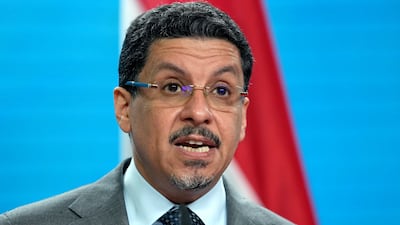A senior Yemeni official has reflected on being kidnapped by Houthi rebels and spoken in depth about the country's civil war -- warning about the dangers of sectarianism in efforts to secure peace.
Yemeni Foreign Minister Ahmad Awad bin Mubarak was speaking at a lecture he gave at the Jordanian Society for International Affairs, in Amman, on Tuesday.
Iran-backed Houthis kidnapped him seven years ago when he was chief of staff to the then Yemeni president Abdrabu Mansur Hadi.
He said his 10-days in captivity gave him a crucial understanding of his adversary.
In detention, his Houthi captors gave him some of their religious pamphlets.
The Houthis belong to the Zaidi sect of Islam and believe in an imamate -- where the ruler must be a descendant of the Prophet Mohammed.
Mr bin Mubarak said the pamphlets portrayed the Houthis, who have their traditional stronghold in Yemen's mountainous north, as divinely chosen to lead Muslims, narrowing the concept of imamate even further.
“I was astonished,” Mr bin Mubarak said. “There have been always internal struggles in Yemen but they were not sectarian or religiously ideological.”
Most of Yemen’s population belong to the Shafii school of Islam. But a Zaidi imamate ruled modern Yemen for more than a millennium until it was overthrown in 1962.
Mr bin Mubarak was on an official visit to Amman.
Jordan is a member of the Arab Coalition that intervened in Yemen in 2015 on the side of the internationally recognised government, which has been led since April by a Presidential Council, formed with support from Saudi Arabia.
The kingdom has a small coastline on the Red Sea and Jordan's late King Hussein brokered a deal in 1994 that defused a potential civil war between northerners and southerners.
The deal was made before the ascendancy of the Houthi rebel group. The north-south schism persists and has played in favour of the Houthis, a main actor in the current civil war.
Mr bin Mubarak, who was educated in Iraq, said the sectarian slant that the Houthis introduced to Yemeni politics in the last decade, and their closeness to Iran, pose an “imminent danger to the Yemeni identity”.
If peace is achieved, this sectarian slant risks a Yemeni political system based on sectarian quotas . This model would be doomed for failure, as Lebanon's experience has shown, he said.
“We do not want a Hezbollah in Yemen,” said Mr bin Mubarak. The Iran-backed Shiite group wields great influence in Lebanese politics.
Disputing suggestions by some in the audience that the Arab intervention in Yemen drove the Houthis to embrace Iran, he said Tehran's support for Houthis started before the war.
Since the 1980s, he said, Iran paid for about 60,000 Yemenis to study at its Shiite seminaries.
In 2012 the government broke up two Houthi-and Hezbollah-linked cells in Yemen. One was smuggling in weapons and the other planning operations against government forces, he said.
Mr bin Mubarak said Iran had been carrying a “carpet weaving” strategy in Yemen and elsewhere for many years.
This means it is building up local allies to take over strategic assets in the region and attack countries opposed to Tehran.
He cited the Houthi advance on Aden, which was repelled in 2015 by Arab-backed Yemeni factions and which he said would have further undermined Saudi Arabia in its “soft belly,” as well as shipping in the Bab Al Mandeb Strait.
The Houthis already control the port city of Hodeidah, north of the strait.
Ahmad Al Battah, a professor at Jordan University, asked how a tiny Houthi minority could gain so much territorial control, Iran's support notwithstanding
Mr bin Mubarak pointed to the war economy, which he said nets the Houthis $1.35 billion a year in extortion and protection money, besides the black market.
He said the Houthis also captured Yemeni army arsenal when they occupied the capital Sanaa between 2014-2015 and initially co-opted the security forces in the city by maintaining their structures, as well as allying with the late former president Ali Abdullah Saleh.
Saleh was killed in Sanaa in 2017 when he turned against the Houthis.
Falah Al Jubour, a retired Jordanian officer who served as a member of the international peacekeeping forces in former Yugoslavia, doubted that a peace deal could conclude the war.
In addition to being a member of the Arab Coalition in Yemen, Jordan is also home to the Office of the UN Special Envoy to Yemen.
About 14,000 Yemenis are seeking asylum in Jordan.
“There is an Iranian project in Yemen and it will not be defeated unless the Saudi effort is supported,” Mr Al Jubour said.
“An ideological war is tough," he said. "It will not end except on the battlefield."


